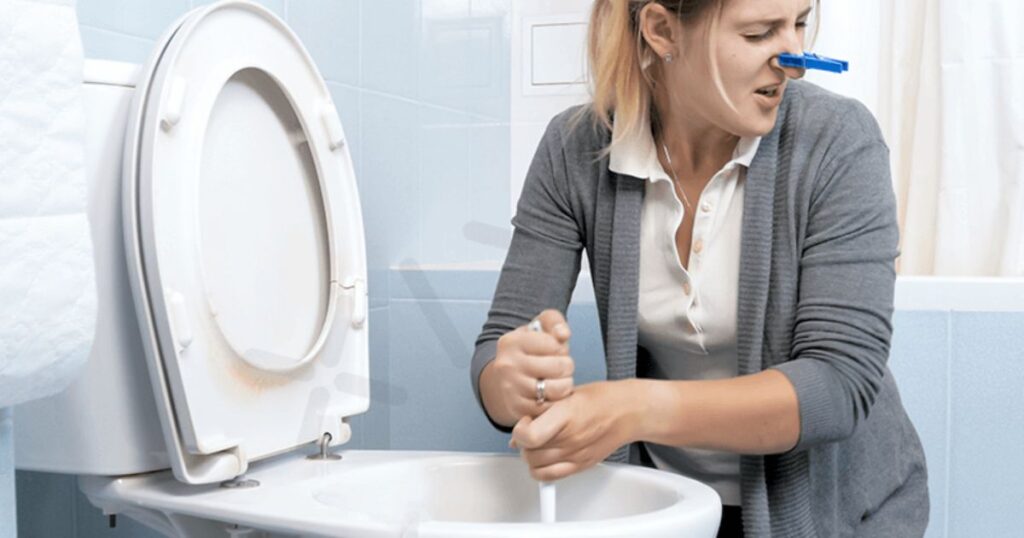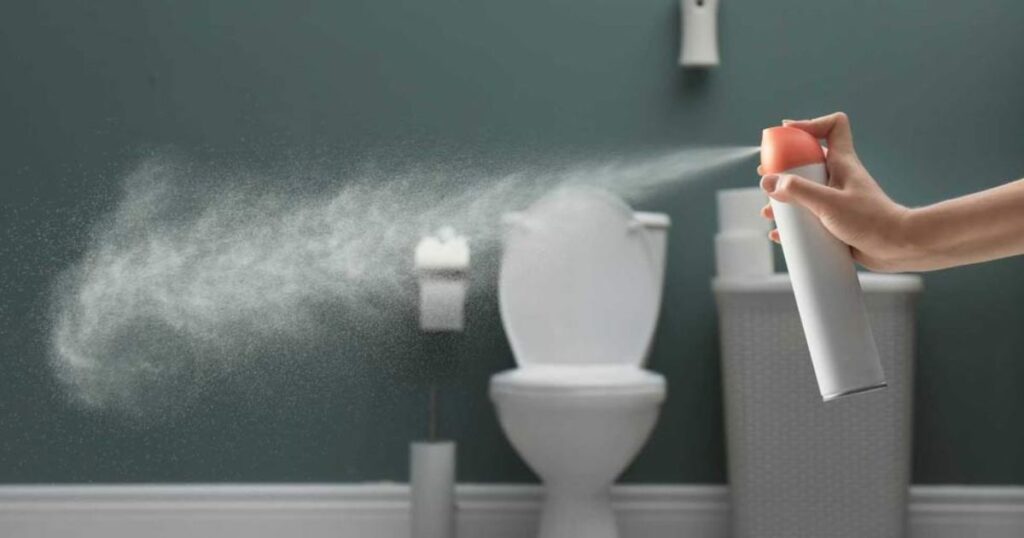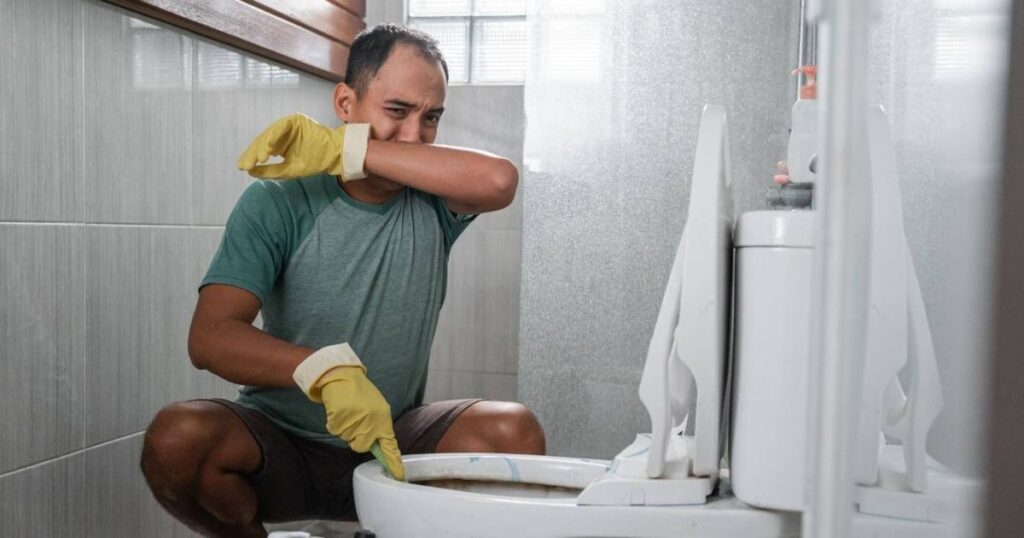Understanding Why Does My Bathroom Smell Like Sewage
Have you ever walked into your bathroom only to be greeted by a foul smell reminiscent of sewage? It’s not only unpleasant but also concerning. Your bathroom should be a sanctuary of cleanliness and freshness, not a place filled with unpleasant odors. But fear not; understanding the reasons behind these odors is the first step to banishing them for good.
Basics of Bathroom Plumbing
Your bathroom’s plumbing system is a complex network of pipes and fixtures designed to ensure proper waste disposal and drainage. Understanding how it works can help you diagnose and solve sewage smell issues.
Toilet Systems
At the heart of your bathroom lies the toilet. When you flush, waste and water travel through a curved trapway in the toilet bowl and out through the waste outlet. The s-shape of the trapway is intentional—it retains some water after each flush, creating a barrier against gaseous backflow from the sewer line.
To further understand the functioning of the toilet system, it’s essential to grasp the concept of a trapway. The trapway is the curved channel inside the toilet that leads to the drain. This design prevents sewer gases from entering the bathroom by creating a water seal. However, if the water level in the trapway drops due to evaporation or lack of use, sewer gases can escape into the bathroom, causing unpleasant odors.
Sink and Shower Drains
Sink and shower drains are fitted with traps, often U-shaped or P-shaped, beneath or within the floor. These traps retain a small amount of water, blocking sewer gases from rising. However, debris can accumulate over time in these traps, leading to blockages and, consequently, odors.
In addition to traps, understanding the importance of regular drain maintenance is crucial. Hair, soap scum, and other debris can accumulate in drains over time, leading to clogs and unpleasant smells. Regularly cleaning drains with a drain snake or commercial drain cleaner can help prevent blockages and ensure proper drainage.
Vent Pipes
Vent pipes play a vital role in regulating air pressure in the drainage system. They also serve as outlets for unwanted sewer gas, releasing it above the house, where it dissipates harmlessly.
Vent pipes are often overlooked but are essential components of a properly functioning plumbing system. Without adequate ventilation, sewer gases can accumulate in the plumbing system and find their way back into the bathroom, causing foul odors. Ensuring that vent pipes are free from obstructions and correctly installed is essential for preventing sewage smells in the bathroom.
Common Reasons for Sewage Smells

Sewage smells in your bathroom can stem from various sources. Let’s delve deeper into some common culprits:
1. Dry P-trap
Dry P-traps are one of the most common reasons for sewage smells in bathrooms, especially those that aren’t used regularly. The water barrier in the P-trap can evaporate over time, allowing sewer gases to waft back up into the bathroom. Simply running water can refill the trap, restoring its function.
To prevent dry P-traps from causing sewage smells, it’s essential to run water in unused bathrooms periodically. This simple act can help maintain the water seal in the trap and prevent sewer gases from entering the bathroom.
2. Shower Drain Clogs
Accumulated hair, soap scum, and other debris can clog shower drains, leading to stagnant water and foul odors. Regularly cleaning drains can help prevent this issue.
To effectively prevent shower drain clogs, consider installing drain covers or screens to catch hair and debris before they enter the drain. A commercial drain cleaner or a homemade baking soda and vinegar solution can also help dissolve buildup and prevent clogs.
3. Damaged Toilet
Cracks or leaks in the toilet’s wax ring can permit sewage odors to escape your bathroom. Inspecting and replacing the wax ring when necessary can help prevent this problem.
If you suspect your toilet’s wax ring is damaged, addressing the issue promptly is essential to prevent further damage and sewage smells. Hiring a professional plumber to inspect and replace the wax ring can ensure the repair is done correctly and effectively.
4. Broken, Clogged, or Poorly Installed Vent Pipes
Vent pipes regulate air pressure in your plumbing system and release sewer gases outside. Damage, blockages, or improper installation can cause these pipes to malfunction, resulting in sewage smells in your bathroom.
If you suspect that your vent pipes are damaged, blocked, or poorly installed, it’s essential to have them inspected and repaired by a professional plumber. Neglecting vent pipe issues can lead to more significant problems with your plumbing system and result in persistent sewage smells in your bathroom.
5. Bacteria Build-up
Over time, a slimy bacterial layer called biofilm can form in pipes. This bacteria can produce foul-smelling gases, especially when it reacts with waste and soap. Regularly cleaning drains and pipes can help prevent biofilm buildup and eliminate foul odors.
To effectively prevent biofilm buildup and sewage smells in your bathroom, consider using enzyme-based drain cleaners or scheduling professional drain cleaning services. These methods can help break down organic matter and prevent biofilm formation, keeping your drains clean and odor-free.
6. Full Septic Tank
If you have a septic tank, a full tank can cause sewage odors to back up into your home. Regular maintenance, including pumping the tank as needed, is essential to prevent this issue.
It’s crucial to schedule regular septic tank inspections and pumpings to prevent sewage smells from a full septic tank. A professional septic tank service provider can assess the condition of your tank and recommend the appropriate pumping schedule based on its size and usage.
7. Sewer Backups
Sewer backups due to blockages or damaged sewer lines can result in sewage smells in your bathroom. Professional assistance may be required to address this issue promptly and effectively.
If you experience sewage smells due to sewer backups, it’s essential to contact a professional plumber or sewage remediation company immediately. Sewer backups can pose serious health hazards and require specialized equipment and expertise to address safely and effectively.
The Importance of Proper Ventilation
Proper ventilation in your bathroom is crucial for maintaining a fresh and odor-free environment. It helps expel moisture and prevent sewer gases from lingering. Air odors can become trapped without adequate ventilation, leading to an unpleasant bathroom experience.
To ensure proper ventilation in your bathroom, consider installing a bathroom exhaust fan or opening windows during and after showering to allow steam and odors to escape. Additionally, regularly cleaning ventilation ducts and fans can help prevent the buildup of dust and debris that can impede airflow and reduce ventilation effectiveness.
Quick Fixes and Long-term Solutions

Addressing sewage smells in your bathroom requires a combination of quick fixes and long-term solutions. Here are some tips to help you combat sewage odors effectively:
Quick Fixes:
- Run water regularly to refill dry P-traps and prevent sewer gases from entering your bathroom.
- Mix baking soda and vinegar to unclog drains and neutralize odors.
- Inspect and repair visible damage to plumbing fixtures, such as cracked toilet wax rings or broken vent pipes.
Long-term Solutions:
- Install mesh guards on vent pipes to prevent debris from entering and causing blockages.
- Regularly clean drains and pipes to prevent biofilm buildup and eliminate foul odors.
- Schedule professional inspections and maintenance to identify and address underlying plumbing issues, especially in older homes or persistent cases of sewage smells.
Read More Posts
How To Remove A Bathroom Sink Stopper?
How To Get Rid Of Mold In The Bathroom: A Practical Guide
FAQs
How do I get rid of the sewer smell in my bathroom?
Run water to refill dry P-traps, clean drains with baking soda and vinegar, and ensure proper ventilation.
Why does my toilet smell like sewage but no leak?
A damaged wax ring or dry P-trap can allow sewer gases to escape without visible leaks.
Why does the bathroom smell rotten?
Rotten smells can result from dry P-traps, biofilm buildup, or damaged plumbing components.
How do you fix the sewer gas smell?
Fix issues like dry P-traps, clogged drains, or damaged vent pipes. Use professional help if needed.
Conclusion
Persistent sewage smells in your bathroom are unpleasant and indicative of underlying plumbing issues. By understanding the common causes and implementing proper solutions, you can eliminate odors and ensure the health and integrity of your plumbing system. Remember, professional assistance is always available if needed. Don’t let sewage smells ruin your bathroom experience—take action to keep your bathroom fresh and inviting.







